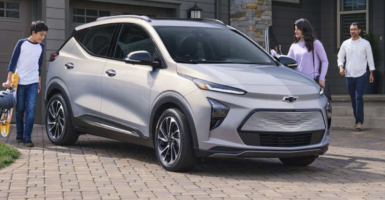Gas-Powered Cars Getting Banned In Almost Every Country
Gas-powered cars will no longer be sold in most countries by the year 2040, per a COP26 declaration.
This article is more than 2 years old
This year, the interest in electric vehicles has increased dramatically. With countries finally starting to take climate change seriously, consumers are accepting electric vehicles will be here to stay. But what about gas-powered cars? According to the COP26 declaration, most countries have signed up to sell only EV cars by 2040, and gas-powered car bans for new vehicles will be in force by 2035 at the earliest.
Both car manufacturers and governments are behind the development and retail of electric vehicles, with nearly every major car and SUV brand releasing at least a hybrid, if not a fully electric, range of cars. With a brand new, vast selection of vehicles, the Biden administration decided to sweeten the electric cars deal by adding a new range of tax credits. These credits can be used if the electric car is primarily made in America and under $80,000. It could give consumers up to $7,500 off the original retail price. With a cash incentive and a range of cars to choose from, the only question is when does the gas-powered car ban come into place?
Canada and most European countries are banning gas-powered cars by 2035, with the east of Europe and part of the rest of the world following suit by 2040. Norway is leading the cross-over to electric cars worldwide with over 86% of vehicles now electric, with Iceland and Sweden next with 72% and 43% of car sales now changed to electric vehicles.
While Europe and the rest of the world are committing themselves to a gas-power car ban, America is missing from the global COP26 declaration. But, various states such as California, New York, Atlanta, Virginia, and Charleston are planning to commit to the COP26 declaration and impose a gas-powered car ban by 2035.

Even though the majority of America is imposing a gas-powered car ban by 2035, the American government has yet to officially impose a nationwide one despite having tax credit incentives to push up the sales of electric vehicles.
The major automotive manufacturers are also shifting to producing only electric cars by 2035, which will significantly reduce the number of gas-powered vehicles available even if no nationwide ban exists, and are also committing themselves to the COP26 declaration.
Companies such as Honda are also planning a gas-powered ban by 2040. Even American muscle cars, Charger and Challenger, will be discontinued in 2024 and changed to electric versions.
So the automotive industry is in a period of great change as it moves from gas-powered to electric. To help with global warming, companies and governments have no choice but to push these zero-emission cars and put in a gas-powered car ban. While all gas-powered vehicles won’t be banned by 2035, people who still refuse to buy an electric vehicle will struggle to find any new versions as no major corporation will sell them. In today’s volatile world, electric vehicles are a stepping stone for countries to become carbon net zero and the beginning of the planet’s resurgence.







